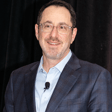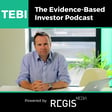Become a Creator today!Start creating today - Share your story with the world!
Start for free
00:00:00
00:00:01

Ep 36: Spencer Jakab on the real winners in the GameStop saga
Transcript
Introduction to TEBI Podcast
00:00:08
Speaker
Hello and welcome to the TEBI podcast. I'm Robin Powell. This podcast is brought to you by Regis Media. And for those who don't know, Regis Media provides high quality video content to financial advice and planning firms that get it. Our clients know their true value lies not in selling investment products, but helping their clients to lead the lives they really want.
00:00:35
Speaker
whether it's marketing or educational content you're looking for, get in touch with us via the website at regismedia.com.
Meet Spencer Yakup
00:00:46
Speaker
Okay, our guest today is Spencer Yakap. Spencer is an investment journalist. He edits the herd on the street column for the Wall Street Journal. Previously, he wrote ahead of the tape and the lex column for the FT.
00:01:03
Speaker
He's just written a book on the GameStop saga called The Revolution That Wasn't. How GameStop and Reddit made Wall Street even richer. I'm certain that you'll enjoy my interview with Spencer Yakub. So, Spencer, thank you for coming on to the Tebbe podcast. Thanks so much for having me, Robin.
00:01:28
Speaker
So tell me very briefly, Spencer, about your career.
Spencer's Journalism Journey
00:01:33
Speaker
I mentioned that you work at the Wall Street Journal, and also why you decided to write this latest book. It's not your only book, you've written other books, but your latest book, The Revolution That Wasn't.
00:01:45
Speaker
So I've been a journalist now for almost 20 years. I spent the first 10 years of my career working in finance, which I fell into by accident. I did enjoy it for the first few years. I was an analyst. I was a highly rated analyst. And then as I got more into just only seeing clients and only managing people, I just got bored with it. And I found the subject matter fascinating. I worked in emerging markets the entire time.
00:02:11
Speaker
A year or two working in emerging markets is like five or six working in developed markets. It's like dog years because you see a lot happen. You see a lot of mania's panics and crashes. I really became fascinated with why things go to the moon and why things crash back down to Earth, sometimes to irrational levels. During my time as an analyst, my parents were
00:02:38
Speaker
pretty poor immigrants to the US. Nobody knew anybody on Wall Street. As I said, I fell into it by accident. And being in the role that I was, wearing nice suits, making a lot of money, having a job in an investment bank, I found people asking me a lot of questions about their finances. And this was, let's say, during the run up to the dot com crash, friends of the family, people who were similar to my parents who had not spent a penny more than necessary and scrimped and saved and
00:03:08
Speaker
Didn't have any support network and backs against the wall and finally had a nice nest egg and and they were investing it in in this crazy stuff and They would ask my my advice about what to do But then as soon as I would give it which is don't do that be careful You know consider yourself lucky take some money off the table They would you know, they would start arguing with me because there are geniuses they had made they had doubled or quadrupled their money in some internet incubator and
00:03:38
Speaker
And then I saw the same thing to a lesser extent in the run-up to the 08 crash, by which time I was a journalist. It's funny, I was more experienced then, of course, but less credible because when you're making less money and not wearing a nice suit, or as nice of a suit maybe, then people tend to take you a little bit less seriously.
00:04:01
Speaker
I'm interested in the subject and I'm interested in helping people.
Writing 'The Revolution That Wasn't'
00:04:04
Speaker
My first book, as you noted, is in a similar vein. It's not about an event like this, but it's about the mistakes that people make and basically how you can become a much better investor, not by doing A, B, C, D, E, F, G, but by just eliminating the mistakes. So if you eliminate your mistakes, you do so much better because the vast majority of investors lag just a simple market average.
00:04:30
Speaker
So the psychological and other tricks. And this book, I knew I had to write it. I knew within 10 minutes that there had to be a book about it and that I wanted to write a book about it. And the nature of the book changed within a few days of my deciding that. I already had gotten a publisher interested.
00:04:53
Speaker
before, a few hours before articles began appearing about GameStop Mania. But I saw it happening. One of my sons, I have three boys, one of my sons brought it to my attention on the Wall Street Bets message board. And within three or four days, I had a much clearer idea, a bit different idea of what the story was because it took some crazy twists.
00:05:15
Speaker
even after that, and turned into something else. It turned into this fable, really, that Wall Street had been beaten, and that this was a way to make money. And so I wanted to, in no uncertain terms, to explain why that definitely was not the case, hence the title, the revolution that wasn't.
00:05:34
Speaker
So what you're saying is, Spencer, you decided to write about this kind of revolution, if you like, or not, in financial services. And then GameStop happened after you'd already decided that that's what you're going to write about. Is that right?
00:05:51
Speaker
Well, I've been writing about it. My first book was about that and then GameStop happened and I just knew my first instinct was this is such a crazy story. This is going to turn into such a crazy story that I have to write about it. It's going to be a landmark event because, you know, I'm a big student of financial history and so I love reading things here in the United States and elsewhere, but the US was a particularly crazy market in the 19th and early 20th century.
00:06:19
Speaker
where you had a lot of sort of these epic struggles, people doing things that are illegal today, watering stock and cornering one another and stuff like that.
00:06:28
Speaker
And that has not really happened. I mean, there are a few great tales, barbarians at the gate and things like that, but you can't get away with things legally that you could prior to the passage of securities laws. And here I saw something that was very much a century or more old maneuver that was being done
00:06:52
Speaker
It depends how you interpret it, but legally and out in the open, so not illegally and behind closed doors and as a plot.
00:06:59
Speaker
on social media because when you ambush people who have sold a stock short, and just to be clear to your listeners who might not be familiar with that term, selling a stock short, there's nothing wrong or illegal about it, but it's a very dangerous profession because you are betting that a stock will decline. Not as most people do, betting a fund or stock will go up over time. And the difference there is that rather than owning it, you
00:07:29
Speaker
expressly don't own it, you borrow it, and then you sell it, and then you have to buy it back, one hopes at a lower price, and then you profit. But the most that you can make from that is if the stock goes to zero, and you made 100%. The most that you or I can make on a stock is infinity. A stock can go up thousands of percent. But the most we can lose is 100%. So if we buy a stock,
00:07:56
Speaker
and it's Enron or something like that, and then tomorrow it goes to zero, then we've learned an expensive lesson, but they don't come and take our home and our possessions. They don't come after the rest of our money. We've just lost the money that we committed. Short sellers are in the opposite position, so they have to be very confident in their position, and they have to be very careful to get out of it if it starts going the wrong way. That's what happened in this case.
00:08:21
Speaker
on steroids,
The GameStop Phenomenon
00:08:23
Speaker
basically. It happened to an extreme level, and it was designed to happen. So that's what made it immediately interesting. And then it took on some new wrinkles that gave it very much a consumer feel, let's put it that way.
00:08:42
Speaker
I'm sure all our listeners will have heard of GameStop. Many, particularly outside the United States, might just benefit from a quick refresh on the details. Just remind us, Spencer, how all this started. Sure.
00:08:59
Speaker
So, I do tell the story, and I'm happy to say that even from people, and I think most people who picked the book up did know at least the basic outlines of the story. They liked hearing it again, and they felt a sense of suspense the way that it was told. I definitely did not want to write a book that didn't capture the twists and turns, but in a nutshell, what happened
00:09:22
Speaker
was that a group of people on a Reddit message board, Reddit is a social media network that calls itself the front page of the internet. It has many subgroups called subreddits where people talk about subjects that interest them, exchange information. And there's one in particular, very raucous one. It's at the beginning of my story, it had just crossed a million members, which made it large, but maybe the 80th largest group on the site. So not one of the top ones.
00:09:52
Speaker
They would talk about how to hack the market, crazy things that you do. People would show off about money that they had made and post screenshots of their account. The membership was more than 90% male, based on a survey of its membership, and more than 92% below the age of 35.
00:10:13
Speaker
male irreverent rowdy audience. And this group began to notice that there were some stocks, and GameStop was at the top of the list, were very heavily shorted. So a stock has a float, which are all the shares available to buy. If a stock is very heavily shorted, then perhaps a fifth of its shares would be sold short, which means that
00:10:37
Speaker
if something, some good news happens or someone shows up and buys it, then those short sellers will rush to buy back up to a fifth of its shares, which is a lot for any normal company. That means that in addition to any good news,
00:10:52
Speaker
there'll be a further surge in the price. And you often see this in the stock market and wonder why did that stock go up so much on this news? It doesn't seem that good. And there's your explanation. They often overshoot to a large extent because there were a lot of skeptics that were forced buyers. This company was at almost 140% when the story nears its sort of really exciting phase. 140% is extremely rare. It is possible without breaking the law.
00:11:22
Speaker
because shares can be sold short, and then the person who buys it doesn't know that they bought a share from a short seller, and then their broker lends the stock out again. GameStop was a real loser company. The other companies that were in this group were AMC Theaters, which was months away from going bankrupt. Those Blackberry, many listeners probably owned a Blackberry at one point, but I doubt they own one today. I used to have one many years ago.
00:11:48
Speaker
Nokia. Again, many people listening to this owned a Nokia phone. It was my first mobile phone back in the 1990s, but my phone today is not. It's made by Apple and so on and so forth. It was a handful of companies like these. They were called the meme stocks collectively because this group used memes as a form of communication, so sort of symbolic
00:12:12
Speaker
funny, irreverent pictures as opposed to necessarily to text, to convey their message and their sentiments.
00:12:22
Speaker
There was one hedge fund in particular that had a pretty large position in this, and they made the mistake of identifying themselves too through some public securities filings. They were being talked about in the open in the months leading up to this. Then some other events happened. A very wealthy e-commerce entrepreneur by the name of Ryan Cohen showed up.
00:12:45
Speaker
with a 10% stake in this company, then he upped his stake, then he wanted board representation, then he got it. And all these things just started to cascade. The news from the company itself continued to be very bad in terms of losses and sales declining and things like that. But that didn't matter because the only thing that mattered for a while was that all these short sellers had bet against it. And it was like,
00:13:09
Speaker
Think about, here's an analogy for short sellers. Short squeezes are not infrequent in the market. You think of a bunch of people in a movie theater or cinema and then someone drops a lit cigarette on the carpet and there's smoke and then people panic and all head for an exit and there's one exit and some of them get trampled and they're all sort of bruised.
00:13:32
Speaker
uh as they as they get out well this was like that except it was a packed house and some people intentionally lit lit it on fire and then doused it with uh with kerosene uh and then threw some dynamite in and then threw some nitroglycerin on top of the dynamite i mean it was they they did everything possible they chose the exact investments they discussed it online to get the most bang for the buck so that these
00:13:59
Speaker
In the end, it was millions of small accounts purchasing GameStop and these other meme stocks in order to really with the express intent of inflicting pain on these hedge funds and sticking it to Wall Street and making money in the process. So it was a twofer.
00:14:16
Speaker
So the prevailing narrative at the time was certainly that this was investor democracy in action, as you say, that little man sticking it to the big guy, almost a sort of follow on from Occupy Wall Street, that it was a way to get back at the wealthy
00:14:38
Speaker
Wall Street financiers. But the central tenet of your book, without giving too much away, is that actually the narrative and reality were really very, very different. That's right. That's right. And listen, I'm a journalist and journalists pride themselves in writing the first draft of history, which is often a messy first draft.
00:15:05
Speaker
And then they come back and revisit things. But the level of interest or the level of readership is highest when you're writing that first draft. And so that's why it's so important to get the tone right. And it seemed at the time to most journalists, there were a handful of skeptics there, who might know it.
00:15:26
Speaker
Most of the headlines were breathless praise of this populist uprising and how they had turned the tables. Would Wall Street ever be the same again? Wall Street has been democratized and so on and so forth. And I say one thing did change in the sense that social media proved to be a potent new force. And these very intuitive app-based brokers proved to be a new force. I go into some detail how they're very symbiotic.
00:15:54
Speaker
And we can go into more detail later in the podcast if you want to go in that direction. But these app-based brokers, which exist elsewhere, not just in the United States, have really lowered the bar in terms of how long you have to think about something and how easy it is and how much it costs and how much you have to know. And especially for people who grew up with smartphones in their hands,
00:16:19
Speaker
their entire sort of lives since they'll say at least age 10 have been with a smartphone or some near predecessor of a smartphone. It's totally intuitive for them. It's just like ordering a pizza. It's easier than ordering a pizza on their phones. So that is different, but they did not stick it to the man because Wall Street is a big place. And most people on Wall Street are middlemen. They're not these one or two hedge funds
00:16:48
Speaker
There's one hedge fund run by one of the best paid men in the world, best paid in 2020, not last year. He took home $846 million personally in compensation in 2020. He was an extremely successful and smart hedge fund manager, but he suffered from hubris and
00:17:11
Speaker
and very bad luck too and he was in the wrong place at the wrong time and he saw the signs and he didn't take them seriously and he cost his investors almost $7 billion in a few days and there were a handful of other funds that also lost a lot of money.
00:17:29
Speaker
But sticking it to three or four hedge funds is not sticking it to Wall Street, especially when you've really enriched Wall Street in the process. And that's what I point out, and a lot of the people who are involved in this don't want to hear that.
00:17:45
Speaker
Um they you know if you look on amazon.co.uk you'll see quite a few one star reviews of people who didn't read the book who say that i'm a shield for wall street. Well i'm just pointing out the truth and the truth is that wall street had a very nice payday uh up and down wall street not just a few parts of wall street almost everybody on wall street
00:18:04
Speaker
had a great time because you've unleashed this wave of money and participation and reckless behavior and from investment banks to market makers to the brokers who took their orders and many people in between it was a wonderful time for them and a less wonderful time for the people who participated. I absolutely understand where you're coming from with
00:18:27
Speaker
reviews. Thankfully, I don't get too many one-star reviews either for my book or for the podcast. But when I do, you can spot them a mile off. They're people who basically don't like what you're saying effectively. And what you're saying was far from the little man winning here. It was actually the big hedge funds and Wall Street. So
00:18:51
Speaker
For those who don't understand why the casino wins in these episodes, just briefly explain. Why were they always going to lose? I mean obviously some people made money out of it, but a lot didn't. Why does Wall Street always win?
00:19:15
Speaker
So, Wall Street is not a casino, but it has many casino-like elements, especially during certain junctures
Wall Street vs. Retail Investors
00:19:21
Speaker
like this. So, let's just use the analogy, Robin, of a casino, okay? Las Vegas is full of casinos. Maybe they're, I don't know how many, 20 casinos on the main strip there. Let's say a group of card counters.
00:19:38
Speaker
goes to Las Vegas. They take a game where the odds are against them, like Blackjack, where you have, let's say on any given hand, even if you're skilled, only a 48% chance of winning. The more you play, the more you lose. They turn the odds in their favor through card counting, which is not illegal, but casinos frown on it.
00:20:01
Speaker
You're kind of persona non grata if you do it. But let's say they do it, they wear disguises and they pretend not to know one another and they go in and they take the casino for tens of millions of dollars. And then they go next door and they take another casino for tens of millions of dollars before they're discovered. And there are newspaper articles about them and all these things. Well, then let's say that in the coming weeks and months, you have hundreds of thousands of people visiting Vegas.
00:20:27
Speaker
for the sole purpose of trying to replicate their luck, but they're less skilled at doing it or the casinos have wised up to them or what have you. The net result is that those one or two casinos had a very bad day or week or month and certainly lost money.
00:20:42
Speaker
but the attention drawn by the handful of people enriching themselves is good for every other casino. And not only is it good for every other casino where people play blackjack and have the typical odds of 48% and plow their money into it, which is good for those casinos, but it's also good for all the middlemen who never risk their money, the people who drive the taxi, the people who clean your room, the people who own the hotel where you stay, the people who own the restaurant where you went to eat, whether or not you made money.
00:21:12
Speaker
All those middlemen who are just there and and benefit from a larger crowd existing and that those middlemen Make up the majority of Wall Street, you know whether it's it's active fund managers or brokers or the market makers who process the trades or the investment banks who benefit from the volatility They they all are just happy that you showed up. They were not hurt by this. They were helped by this. They liked it. They liked this
00:21:44
Speaker
The story doesn't just cover this period of 10 or 11 days. It goes back to 2019 and this moment in time prior to and then during the pandemic where in the United States, you had more than 10 million new retail trading accounts opened mostly by these young, completely inexperienced investors who felt like they were geniuses because they came into it at a time.
00:22:07
Speaker
When social media was all abuzz, all of a sudden, of all things Wall Street, it's not a very cool thing generally for young people, but it became a cool thing. It became a real pastime. Sports betting went away.
00:22:19
Speaker
I know in the UK it's existed for a while, but in the US it only has existed since 2018 through smartphones. It existed prior to that just in person in Las Vegas and the Supreme Court ruling. So you had lots of young men who were into sports betting on their phones. You had people all of a sudden who were home because of the pandemic in the early days, especially who usually spend all their money that they make right away. They were getting extra money from the government and they had nothing to spend it on.
00:22:49
Speaker
And many people explicitly said they took their stimulus checks and they put it into a brokerage account and gambled with it.
00:22:55
Speaker
And what you also had was quite an extraordinary bull run. And not just that markets went up a lot, Robin. It's that almost every stock went up. So from the bottom of the March lows, a year later, 96% of stocks went up. That's never ever happened before. It was almost impossible. It was like shooting vision of arrows, almost impossible to pick a loser. And success is a very bad teacher.
00:23:27
Speaker
You're listening to me, Robin Powell, interviewing Spencer Yakub from the Wall Street Journal on the Tebby podcast brought to you by Regis Media. Now, perhaps you're one of those people who've tried trading stocks on a site like Robin Hood. Maybe you had a good outcome or maybe a bad one. But having listened to what Spencer has had to say, you're not convinced that buying and selling individual shares is such a good idea.
00:23:57
Speaker
Now if that is you, there's a book that I've just written with fellow financial blogger Ben Carlson that you really ought to read. It's called Invest Your Way to Financial Freedom and it's published by Harriman House.
00:24:12
Speaker
mainly written for a UK audience, the book has no hidden sales agenda and is based on peer-reviewed academic evidence. It explains in simple terms how young investors can develop good habits, save a fortune in unnecessary fees and achieve financial freedom many years earlier than they otherwise would.
00:24:35
Speaker
You can either buy the book direct from the publisher or via Amazon. The book is in paperback and there are Kindle and Audible versions too. So that's Invest Your Way to Financial Freedom by Ben Carlson and me Robin Powell. All right, on with my interview with Spencer Yakup.
00:24:56
Speaker
I mean, having a retail brokerage account is not a problem. I'll tell you that unfortunately they went out of business because of people like me, I guess, but there was a nice gym here in my town that I could walk to. I live outside New York City. I went there for years. My wife was a member too, and it was cheap, and it was clean, and it was open early, and open until late. I'd go every day.
00:25:24
Speaker
I was surprised when they went out of business and then I thought about their business model and realized that I was sort of a free rider because I just paid the minimum. I didn't pay for lessons or protein shakes or classes or anything like that. And not enough people were doing that and they needed people like that to be able to stay in business. And so I was, as long as people were doing that, I was sort of a free rider on all of their spending because the gym could never make money off of just people like me.
00:25:54
Speaker
In the same way, a broker like Robinhood in particular here in the United States that pioneered this zero dollar commissions can never make money off of you if you just go in and you buy a handful of exchange traded funds or index funds and then just don't check your account very often. They still have to honor your account. They still have to open it.
00:26:15
Speaker
It's still convenient. It's still insured like any other broker. You can open an account there or any other discount broker. I'm not discouraging people from getting on the ladder and opening some account, but you don't have to be like their typical customer. Their typical customer was hyperactive by any stretch of the definition. They checked their account more than seven times a day. There were customers who traded more than 10,000 times in a six month period.
00:26:43
Speaker
Which is crazy. Think about that. So you're trading at an annual pace of 22,000 times a year. So even with the cheapest commission-only broker, you would have been spending more than $100,000 on commissions when commissions existed. The absence of commissions, you didn't think about that. You thought of it as free, and some people traded
00:27:06
Speaker
a crazy, crazy amount. And it's been shown in study after study that the more active you are, the worse your results are on average. Of course, there are going to be exceptions to any rule like that. But there's a very, very stark, clear, inverse correlation between your level of activity, even your level of attention to your account and your results as a retail investor.
00:27:29
Speaker
Well, that's interesting because you talk about this sort of zero commission aspect and that's certainly appealing to people. They think they're getting something free. But in fact, that's not necessarily the case. I mean, these firms always find a way of making their money somehow. Just explain how those zero commission trades are subsidised, if you like, and how the customer does end up paying anyway.
The Cost of 'Free' Trades
00:28:00
Speaker
Sure. So in the United Kingdom and Canada and some other places, if you buy a stock, unless you do something like a contract for difference or whatever, let's not get into that to that sideline, but if you buy a stock or sell a stock, it goes through an exchange, which is a lit exchange. So one of those many transactions that you see if you watch those things was your transaction. In the United States, there
00:28:27
Speaker
are stock exchanges. There are about 15 stock exchanges, actually. But many retail orders don't go through those. They go to a market maker, which is not lit. It's dark.
00:28:40
Speaker
you don't see what happens. It goes into their black box and it comes out of their black box. And the only requirement for one of those to exist is that they give you at least as good of a price as exists on the stock exchange. And sometimes they give you a better price. So they say, and they're not lying, that they give very good execution. They have really powerful computers. But they're not a charity, right? Even if they give you a better price, there's a reason they were able to give you a better price. They keep a little bit of it.
00:29:08
Speaker
So the most successful, or the largest, I should say, but probably the most successful by some order of magnitude, is called Citadel Securities. They were the main payer to Robinhood because Robinhood sold its customers' trades to Citadel Securities and other firms.
00:29:31
Speaker
those companies paid Robinhood. They said, we'll pay you this much per trade. They paid a certain number of dollars per transaction, more for options than for shares. And that's how Robinhood in 2020, which I describe in some detail, is how they made most of their money. That's how they kept the lights on. That's how they got their revenue. The company that was its biggest counterparty
00:30:00
Speaker
had revenue of over $6 billion that year. It's a private company, but that figure leaked and they confirmed it to me. It had operating profit of over $4 billion that year. We don't know how they did during the meme stock squeeze, which was a
00:30:15
Speaker
a period of much higher activity because those figures did not leak. I imagine that the business was really pretty good. The major shareholder of Citadel Securities was called before Congress to testify weeks after the meme stock squeeze and asked a lot of questions about his business.
00:30:37
Speaker
That's how it happens. It's not free. Obviously, if what you're doing is being sold and it's not free, when you go on Facebook or Instagram, it's not free either, especially if you're very active, it's not free. If you're putting up pictures of yourself and your children and clicking on things and giving personal information, then those companies know how to advertise to you. They know that you're a real person, which is very valuable. They have pictures of you that they store away.
00:31:01
Speaker
They know about your likes and dislikes and preferences and your circle of friends and lots of demographic information about you. And that's how they make so much money. You are not paying for it, but you're the product. And I think that that applies to these brokers that don't charge commission. They have made their customers unwittingly the product.
00:31:22
Speaker
And to their credit, they have as successful businesses, they have made the whole process, as you said earlier, as simple as possible.
00:31:39
Speaker
you know i i sort of started to become aware of stocks and so on you know here you'd have to actually go into a stock broker to to sort of place trades and so on but but now you can literally just do it on your phone while you're waiting in the queue for a sandwich or whatever it is um it it is it is that easy um and it's it's that kind of um
00:32:06
Speaker
combination, if you like, of the technology becoming available to enable those easy transactions to take place. And as you say, social media as well, at the same time, which almost plays on our herd mentality.
Risks of Trading Apps
00:32:27
Speaker
Are you worried about sites like Robin Hood and so on, and the impact that they might have on young people? Particularly as you said, it was hard not to make money for most of 2020 and 21. But as we've seen lately, markets can go down as well as up. And a lot of those young people who think they're geniuses are going to have a very rude awakening.
00:32:57
Speaker
Yes, I am worried because in this country in particular in the United States, people speak about a retirement crisis, people who are five or 10 years away from retirement and we have a very
00:33:12
Speaker
a tattered social safety net here, and they have little or nothing saved. They've made errors, or they've had their pockets picked along the way, or they didn't realize the value of saving them too late, or they're paying too much to people who are not really looking out for their interests to build a nest egg, or what have you, or they just had bad luck.
00:33:34
Speaker
But there's a retirement crisis for young people, too, because young people, up until this episode, were not very interested in finance and saving. There would be young people at my place of work in the United States who were financial journalists, but maybe they would say they're journalists first, and then finance was where they got the job, and so their interest level in finance wasn't
00:33:55
Speaker
universally high, you know, and it just would come up like, oh, there's a workplace savings plan, you know, that you get this tax advantage here in the US and ask them about it. And like, no, no, I haven't started doing that. Like, you know, this is the easiest, best time for you to save. So they just weren't engaged as a generation. It wasn't cool. So here, here's something that made it cool. That made it very, very easy. And let me tell you how easy you could hear about something on social media.
00:34:22
Speaker
You could open an account and you could trade within 10 or 15 minutes. That's how easy it was. So it takes a few days for money to... I opened an account with a more established broker. I could open an account now. It would be days before I can actually make a transaction. I have time to cool off and think about it, about that thing that I just heard about from my friend.
00:34:46
Speaker
But with Robinhood, their default mode is that they'll say, yeah, okay, we know the money's coming. We'll just let you trade with our money. They don't say that because they don't have to explain the system of cash moving through the United States economy, but they say you can trade right away.
00:35:01
Speaker
And these people think that they're trading with their money. And it's so easy and so intuitive and such a beautiful app, so intuitive especially for that generation, that there's no friction there. So they go straight from hearing about it on one app on their phone to acting on that tip.
00:35:21
Speaker
On another app on their phone it might take five or ten seconds to do and that's it and and you need to think more than five or ten seconds before Before investing your money into something so I I do see problems because this generation well some of them I think will take the right lessons from it and Realize that they you know slow and steady wins the race but I think a minority I think some minority will become degenerate gamblers as a result because
00:35:48
Speaker
three or four percent of people who spend time in a casino will become degenerate gamblers. It's the same just like alcoholism or anything else. I think some people just have a propensity to do that, which is really a shame because it's a form of gambling too. Then some subset will become very bitter about Wall Street and walk away from it and think that it's crooked.
00:36:13
Speaker
And it's really not crooked. Most people working in finance are not crooks. You have to engage with them on your terms, to your benefit, and to be educated. Pay as little as possible. Don't deal with charlatans. Deal with people who get paid on the back end rather than the front end.
00:36:33
Speaker
like these brokers, and you can have a very fruitful relationship with the financial establishment because the stock market is a wonderful compounding machine over the decades, and they're costing themselves a lot of money if that's the conclusion that they draw.
00:36:51
Speaker
There is a theory, isn't there Spencer, that it's actually good for young people to kind of make mistakes early on in their investing career. I hear that argument quite a lot.
00:37:04
Speaker
You mentioned that you've got children as well, and I do too, who I've encouraged to kind of invest sensibly, but I would be horrified to think of them risking large amounts on these meme stocks or cryptocurrencies and so on.
Are Early Investment Mistakes Beneficial?
00:37:24
Speaker
What do you make of that argument that we ought to let young people make their own mistakes?
00:37:30
Speaker
Well, first of all, enough young people as a group. The technological changes that have made a lot of good things possible in finance, like index funds, like robo-advisors and things like that, also have made this possible.
00:37:49
Speaker
It wouldn't have been possible 20 years ago for somebody with $50 in the United States to open a brokerage account and trade. They wouldn't have allowed them to do it. They would have chewed through their money very quickly if they chose to be active, and that would be that. Today, the costs and the whole complications of the process have been
00:38:14
Speaker
through technology and competition have been brought down to the point that you've opened finance up to people with very little money, which is good and bad. I think that these are just more fish to be fed to the sharks as far as Wall Street is concerned. I don't like fish being fed to sharks, whether they're middle-aged people with big savings or young people with not a lot of savings. I don't think that it's positive period, $100 or $1,000 when you're 23 years old,
00:38:44
Speaker
has a long, long time to compound the ultimate cost of that money when you really need it, when you're too old to work or you're ill or whatever. It could be a lot more if you were to invest it sensibly, not just fritter it away on stuff. I think that there are definite downsides. There are psychic downsides and there are financial downsides to making
00:39:10
Speaker
making those mistakes. No, so I don't like seeing people preyed on by these companies and by financial influencers at all. I think it's a negative for most of them. I hope that I'm wrong about that, but we'll see. Let's have this discussion again in 20 years, Robin, and maybe I was wrong and I hope so, but I don't think that it's a good thing.
00:39:32
Speaker
Well, it's been really interesting talking to you. A lot of it's actually been a little bit depressing and a little bit scary, but maybe we could just end on a slightly more positive note. Towards the end of your book, you basically...
The Case for Passive Investing
00:39:51
Speaker
I can't remember the name of that chapter, but you... It's called bonus round. Yeah, it's a very video game theme, cheat code bonus round.
00:39:58
Speaker
Yeah. So you're basically explaining how, you know, actually, things are pretty good for investors today. If you just don't play there a game, play a different, less exciting game, in a nutshell, what is that game that investors should be playing?
00:40:22
Speaker
So, the goal of this group was twofold. Not everybody had the same two goals, but the significant overlap. Stick it to Wall Street and make money. Now, if you have a dim view of Wall Street, and I do understand why many people do, here's a way to stick it to Wall Street by paying them very little and to do well, to, let's say, to outperform 85% of your peers. Do well.
00:40:45
Speaker
And that's by basically not playing the game, by being passive, by engaging with Wall Street in the cheapest way possible, as infrequently as possible, not buying the recommendations of whether they're
00:41:01
Speaker
young financial influencers or older talking heads in suits who go on TV, who go and tout stocks, just tune it out and ignore it. You don't need sophisticated, deep financial knowledge. You just need to understand these incentive structures of this business and you need to understand slow and steady wins the game. Compound interest is a very powerful force. You don't need to be a great financial expert. I think you just need to
00:41:24
Speaker
to understand the industry's incentives and that there are really cheap, good ways to engage with it. For example, through index funds or rebel advisors, or if you need a human to hold your hand, then a human advisor who's a fiduciary, who looks out for you, who will hold your hand and just don't check in on it constantly. Check in on it as save, but trust the process and you'll
00:41:48
Speaker
you'll do quite well and Wall Street will not like you because you are. So if you don't like Wall Street, the feeling will be mutual because Wall Street is making very little money from you. They used to make a lot of money doing things like that and these days it's been computed down to pennies. So you'll be like me going to the gym. Not that I wanted my gym to go out of business, but you'll be like me. If everybody's like me, then the gym can't make money and you can be the same kind of economic free rider.
00:42:19
Speaker
That's about it from this episode of the Tebby podcast. A huge thank you to Spencer Yakav for coming on and talking about his new book, The Revolution That Wasn't. It's published by Penguin Books and do read it, you won't regret it.
00:42:35
Speaker
If you've enjoyed this episode, please like it and subscribe to the podcast. We'd love you even more if you could write a review. And one more thing, content such as this would not be possible without the help of our strategic partners, to whom we are extremely grateful.
00:42:56
Speaker
Tebbi's principal partners in the UK are S&P Dow Jones Indices and Sparrows Capital. We also have a strategic partner in Ireland PFP Financial Services, a financial planning firm in Dublin.
00:43:11
Speaker
We're currently seeking partnerships in North America and Australasia with firms that share our evidence-based and client-focused philosophy. So if you're interested in finding out more, do get in touch via the TEBI website at evidenceinvestor.com. Thank you for listening. Until next time, goodbye.
















